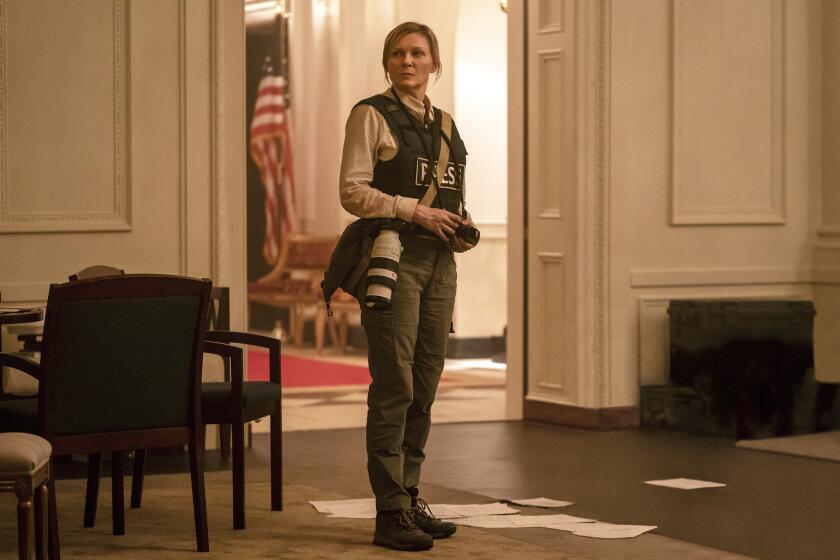New Film4 chief Daniel Battsek on Amazon, Nate Parker and his Miramax past
The British company Film4 was one of the quiet powerhouses of last Oscar season, responsible in part for contenders such as “Room,” “Carol,” “45 Years” and “Ex Machina.”
The financing-and-production firm will be back again this season, with dramatic pieces that include the coming-of-age tale ”American Honey” and Ang Lee’s military-themed “Billy Lynn’s Long Halftime Walk,” both expected to compete for prizes.
But not all is as it was at Film4. The company has a new director, after David Kosse, an American who had come to Britain to run the Channel 4 subsidiary, departed. He was replaced in the spring by Daniel Battsek, a Brit who has spent the last decade at American companies. Most notably, Battsek ran a post-Harvey Weinstein Miramax, steering films such as “The Queen” and “No Country for Old Men” to Oscar and box-office success. (Less fruitful excursions included “Blindness” and “Adventureland.”)
The Times caught up with Battsek ahead of the Toronto International film Festival, the premiere Oscar showcase that begins Thursday, to talk about his vision for Film4 and his view of the larger cinema world.
One of the things you hear about Film4 is that it has great taste but that may not be not enough anymore — to compete you have to be more global, as adept at horror movies that play in Russia as dramas that cater to the British and U.S. art-house scenes. Do you agree?
I think you have to be careful not to go too hard on the Oscar beat. You can find yourself making films entirely for the purpose of winning awards, and even if you manage to do that, maintaining continuity in that area is bloody hard. You can also find yourself with too homogeneous a slate. And homogeneous is nice, but it ain’t paying the bills.
So what does that mean for Film4?
I’ve been keen to find movies that are diverse, in every sense of the word, potentially commercial projects in addition to Oscar films. At Toronto, we have “American Honey” and [sexual-assault drama] “Una,” but we also have Ben Wheatley’s [action thriller] “Free Fire.” We have Martin McDonagh’s new film later. Whatever we do with Lenny Abrahamson and Steve McQueen [the “Room” and “12 Years a Slave” directors, both longtime Film4-ers] I suspect it will have that mix of commerciality and artistry. I’m happy to have a mix of both escapist fare and movies that resonate with contemporary life as long as the filmmaking is of a high standard.
Miramax tried to skate that line and managed to pull it off, until it didn’t. What did you learn from that experience that you can apply here?
[Laughs.] I can give you a whole host of things I say I learned and will never do again. But I can’t guarantee that’s the case. I think the thing to keep in mind is to force yourself not to get too carried away in a success. The word is balance. There is a lot to build on.
On the subject of award season, there’s the question of marketing dollars. We keep hearing studios are more disciplined. And yet budgets seem to get more extravagant every year. Does it need to be reined in?
I believe you need to keep a sense of realism and the bottom line. You need to keep your head screwed on and fingers from leaping to the cookie jar every time an opportunity comes around. But of course even though this is a time when everyone is allegedly being sensible, no one is.
See the most-read stories in Entertainment this hour »
Why do you think that is — is it just placating filmmaker and celebrity egos?
Some of it is that. But I also think when you have those movies that have no hope of winning, sometimes your only hope of a return on investment is being considered a participant in the game. There are movies that remain in the race way beyond when anyone thinks they should because you can gain commercially from that. There are tactical reasons, certainly, even if they don’t appear very tactical.
That actually works with ticket buyers?
You’d be surprised. Not all of the time. But it can.
The independent-film market has been through plenty of ups and downs. But this seems like a particularly challenging time. There’s more competition on the one hand, what with start-ups and the Amazons and Netflixes. And at the same time, the audience for indie features seems to be dwindling. Are you pessimistic about the longer term?
It’s a rocky road. But there are distinct signs of life. There’s the success stories of A24, of Roadside, of Bleecker Street, of Amazon. There are lights at the end of various tunnels that I find encouraging.
Of course that competition isn’t entirely bad for you, since you’re not in the distribution business.
We have relationships with many different companies, and I feel like they have the appetite for the kind of content we’re able to produce and co-finance. I have no fear of [new players] because I believe very strongly they need our skills, our ability to find and develop material, our relationships.
You’re also trying to take bigger financial positions in movies, with your parent company increasing your budget to $35 million from $20 million. It can be rewarding when a movie hits, but risky if it doesn’t.
You said it: There are bigger risks but also bigger rewards. We think they’re worth taking.
And the fact that you’re still a fundamentally British company, does that limit your upside? “45 Years” is a great film, but how many people in the U.S. are going to see it on a Saturday night?
When I first came to the U.S., filled with British pride, I sat in my office and thought I was looking through the wrong end of a telescope. Great Britain looked very far away and not very influential. But in all the years I worked in America it changed dramatically. The influx of British filmmakers and the sensibility that people might have thought was weird and British is now mainstream. It’s all been internationalized in a way that I think helps us.
I have to ask you about a very American film. There’s so much drama around Nate Parker’s “The Birth of a Nation” [with the resurfaced rape allegations against Parker]. I’m not sure there’s been a movie that’s run the gamut as wildly before its release — “It’s a certain winner!” “It’s completely dead.” What do you see happening with it in the end?
It’s a helluva long campaign, as you know only too well. You have to be aware of that through all the highs and lows. We have to see what develops. We’re about to get the spotlight — pun intended — on what will be the genuine contenders. But even then the fall festivals only color the picture. There are always one or two movies that come out of left field. That’s what makes this time of year so fun and so frustrating.
On Twitter: @ZeitchikLAT
More to Read
Only good movies
Get the Indie Focus newsletter, Mark Olsen's weekly guide to the world of cinema.
You may occasionally receive promotional content from the Los Angeles Times.







